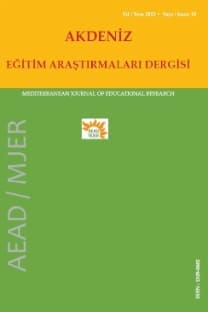Preservice Science Teachers' Knowledge of Energy Resources: An Adaptation Study
Fen Bilgisi Öğretmen Adaylarının Enerji Kaynakları Hakkındaki Bilgisi: Bir Adaptasyon Çalışması
___
Anderegg, W. R., Prall, J. W., Harold, J., & Schneider, S. H. (2010). Expert credibility in climate change. Proceedings of the National Academy of Sciences, 107(27), 12107-12109.Arslan, H. O., Cigdemoglu, C., & Moseley, C. (2012). A three-tier diagnostic test to assess pre-service teachers’ misconceptions about global warming, greenhouse effect, ozone layer depletion, and acid rain. International Journal of Science Education, 34(11), 1667–1686.
Attari, S.Z., DeKay, M.L., Davidson, C.I., & Bruine de Bruin, W. (2010). Public perceptions of energy consumption and savings. In Proceedings of the National Academy of Sciences, 107(37), 16054- 16059
Backhoff, E., Larrazolo, N., & Rosas, M. (2000). The level of difficulty and discrimination power of the Basic Knowledge and Skills Examination (EXHCOBA). Revista Electrónica de Investigación Educativa, 2(1).
Barrow, L.H., & Morrisey, J.T. (1989). Energy literacy of ninth-grade students: A comparison between Maine and New Brunswick. Journal of Environmental Education, 20, 22-25.
Bittle, S., Rochkind, J., & Ott, A. (2009). The Energy learning curve: Public agenda. Retrieved 02/06/2018 from https://www.publicagenda.org/files/energy_learning_curve.pdf
Bodzin, A. (2012). Investigating urban eighth-grade students’ knowledge of energy resources. International Journal of Science Education, 34(8), 1255–1275.
Brooks, G. P., & Johanson, G. A. (2003). Test Analysis Program. Applied Psychological Measurement, 27(4), 303-304.
Crocker, L. & Algina, J. (1986). Introduction to Classical and Modern Test Theory. New York: CBS College Publishing
DeWaters, J., & Powers, S. (2011). Energy literacy of secondary students in New York State (USA): A measure of knowledge, affect and behavior. Energy Policy, 39(3), 1699-1710.
DeWaters, J., Qaqish, B., Graham, M., & Powers, S. (2013). Designing an energy literacy questionnaire for middle and high school youth. The Journal of Environmental Education, 44(1), 56-78.
Domino, G. & Domino, M. (2006). Psychological testing: An introduction (2nd Ed.). New York: Cambridge University Press.
Doran, P. T., & Zimmerman, M. K. (2009). Examining the scientific consensus on climate change. Eos, Transactions American Geophysical Union, 90(3), 22-23.
Ebel, R. L., & Frisbie, D. A. (1986).Essentials of educational measurement (4th ed). Englewood Cliffs, NJ: Prentice-Hall
Intergovernmental Panel on Climate Change. Climate Change 2007—Mitigation of Climate Change: Working Group III Contribution to the Fourth Assessment Report of the IPCC (Cambridge: Cambridge University Press, 2007).
Karabulut, A., Gedik, E., Keçebaş, A., & Alkan, M. A. (2011). An investigation on renewable energy education at the university level in Turkey. Renewable Energy, 36(4), 1293-1297
Karatepe, Y., Neşe, S. V., Keçebaş, A., & Yumurtacı, M. (2012). The levels of awareness about the renewable energy sources of university students in Turkey. Renewable Energy, 44, 174-179.
Kılınç, A., Stanisstreet, M., & Boyes, E. (2009). Incentives and disincentives for using renewable energy: Turkish students’ ideas. Renewable and Sustainable Energy Reviews, 13(5), 1089-1095.
Ministry of National Education of Turkey. Science curriculum of elementary schools (3rd- 8th grades) (in Turkish.). Ankara, Turkey: Board of Education. Retrieved 07.07.2018 from http://mufredat.meb.gov.tr/Dosyalar/201812312311937-FEN%20B%C4%B0L%C4%B0MLER%C4%B0%20%C3%96%C4%9ERET%C4%B0M%20PRO GRAMI2018.pdf
NEETF. (2002). Americans' low "Energy IQ:" A risk to our energy future/why America needs a refresher course on energy. Washington, DC: National Environmental Education & Training Foundation.
Tietenberg, T. & Lewis, L., 2012. Environmental & Natural Resource Economics, New Jersey: Pearson Education.
Ugurlu, O. (2006). Turkiye'de cevresel guvenlik baglaminda surdurulebilir enerji politikalari. Unpublished doctoral dissertation, Ankara University, Ankara
Yüksel, I., & Arman, H. (2014). Energy and Environmental Policies in Turkey. Energy Sources, Part B: Economics, Planning, and Policy, 9(1), 57-69.
Zyadin, A., Puhakka, A., Ahponen, P., Cronberg, T., & Pelkonen, P. (2012). School students’ knowledge, perceptions, and attitudes toward renewable energy. Renewable Energy, 45, 78-85.
Zyadin, A., Puhakka, A., Ahponen, P., & Pelkonen, P. (2014). Secondary school teacher knowledge, perceptions and attitudes toward renewable energy in Jordan. Renewable Energy, 341-348.
- ISSN: 1309-0682
- Yayın Aralığı: 4
- Başlangıç: 2008
- Yayıncı: Tayfun Taşbilek
Türkiye'de Kimya Eğitimi Alanında Yapılan Lisansüstü Çalışmalar
Sınıf Öğretmeni Adaylarının Teknolojiyi Kullanma Sıklığı
Ortaokul Beşinci Sınıf Matematik Dersi Öğretim Programının Kesirler Ünitesinin Değerlendirilmesi
ÇAĞLAR NACİ HIDIROĞLU, İBRAHİM TUNCEL
Örgütsel Erdemlilik ile Örgütsel Sağlık Arasındaki İlişkinin Öğretmen Algılarına göre İncelenmesi
Mutlu UYGUR, TUğba YANPAR YELKEN
Öğrencilerin İnternet Kısıtlamalarına Karşı Geliştirdikleri Yöntemlerin Belirlenmesi
Öğretmen Adaylarının Çokkültürlü Eğitim ve Kimlik İşlevlerine İlişkin Algıları
OSMAN FERDA BEYTEKİN, Ayşegül PALTA
Yunus Emre İle İlgili Araştırmaların Bibliyometrik Analizi
BEYTULLAH KARAGÖZ, İZZET ŞEREF
Bağlaşık Öğretimle İlgili Yapılan Doktora Tezlerin İçerik Analizi
Ortaokul Matematik Öğretmenlerinin Alan Ölçme Konusundaki Anlamalarının İncelenmesi
